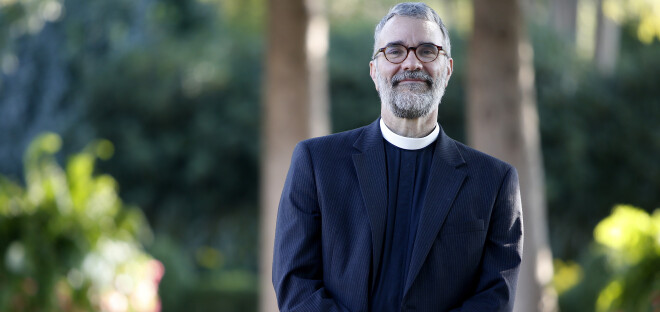Why Bishops Matter (and Don't)

The last few days have involved enough things episcopal to last a decade! Thanks to all whose efforts made the events possible.
Last weekend I heard a bon mot of the great Archbishop of Canterbury Michael Ramsey. The question was whether having bishops is of the essence (esse) of simply the well-being (bene esse) of the Church. Ramsey quipped they must be of the esse, for they sure aren’t of the bene esse! After all that pomp it is good to take a little air out of the episcopal tires.
This has set me to thinking about the question, and I think the answer is that bishops do matter to the extent that their ministries make it plain that they don’t! By this I mean that they exist to point at, and remind us of, things true quite before and outside of them. They matter in pointing away from themselves, and in this are the same as clergy and lay leaders of the Church too.
First of all, we recall that Paul always cites the apostles in his letters as witnesses of the resurrection of Jesus. That is the new and creative thing they are sent to tell people about. This means that bishops too, heirs and servants of that apostolic ministry, are to do that same thing. And it also means that they are not to worry overmuch about creativity or originality- those have been covered primarily by Jesus Christ, though we do think about how to lift up the news about Him in our time.
Secondly, priests in every place and time have oversight for the ministries of Word and sacrament, in companionship with their bishop. But the latter has a special care to protect the continuity and the recognize-ability of the Gospel. They are bridges, seeing that the same Gospel is received from our grandparents and passed on to our grandchildren. They are signs that salvation is the same for the human being in Dallas, Toronto, Cairo, and Singapore. Here too the particularity of the bishop is less important the reliability of what is passed on.
Third and finally, we can return to Archbishop Ramsey. He thought hard about the question of holding the more catholic and evangelical wings of the Church together. The first emphasized the apostolic succession of teaching, the second the apostolic succession of persons down the ages. Ramsey wanted to hold the two together, the latter existing to guarantee the former. So the point is this, the special role of bishops has the focused purpose of serving the faithful succession of the Creed, the gospel, the hearing of Scripture. Apart from these his or her ministry is of no consequence.
One last point of a different kind. Last Sunday I had a great time with Emmanuel Anglican Church, our Nigerian congregation at St. Luke’s. Members of their Mothers’ Union wore dresses with the picture of Mary Sumner, wife of an English bishop of the mid-19th century and fonder of the Union on them. I have written of her before. But it is good to recall once more that most mission in our tradition was initiated by lay men and women like her. The job of the bishops was not to get in the way, in Winchester’s case so his wife could get on with it.
I guess that means two cheers for bishops! But not on their own, but on the basis of what they exist to witness to. For me, as for all of us in the face of God’s call, there is a challenge, and a relief too.
Peace, GRS



